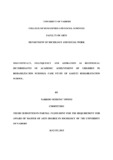| dc.description.abstract | There is evidence that most children in rehabilitation school register poor academic achievement
levels (Foley, 2001; McMillen, Auslaunder, Elze, White and Thompson, 2003; Estes, 2009). The
children in correctional facilities also register low levels of self-efficacy, high levels of
delinquency and low academic aspirations. The purpose of this study was to find whether there is
an association between self-efficacy, delinquency and aspiration and the academic achievement
levels of children in rehabilitation school.
The study was conducted in Kabete rehabilitation school in Nairobi County, Kenya. It was
guided by the analytical research design that enabled the researcher to analyze the association
between self-efficacy, delinquency and aspiration (independent variables) and academic
achievement (dependent variable). Data was collected using an interview schedule administered
to all the children (85) who were registered in the institution at the time of the study. The
interview schedule had sub-sections with family background, self-efficacy, delinquency,
aspiration scales to collect data on these variables. Data on academic achievement was collected
from the academic progress records of individual children in the school at the time of the study.
Individual case files of the participants provided additional information about the family
background and experiences prior to committal to the rehabilitation school.
The study found out that most children in the rehabilitation school (80%) had low levels of selfefficacy.
Only 20% registered high levels of self-efficacy. When delinquency levels were
considered, 70.6% of the children rated high while 29.4% rated low. In terms of aspiration, the
study found that most children in the institution (60%) had high levels of aspiration compared to
40% who rated low in aspiration. In terms of academic achievement, the study found that 70.6%
xii
of the children in the rehabilitation school at the time of the study were below average in
academic achievement compared to 29.4% who were above average.
A chi-square test of association found that there was an association between self-efficacy and
academic achievement, self-efficacy and delinquency, delinquency and academic achievement
and aspiration and academic achievement among children in Kabete rehabilitation school at the
time of the study. Based on the findings, the study recommends development and
implementation of programs that will improve children’s sense of self-efficacy and aspiration.
Programs targeting reduction of delinquent attitudes among children in rehabilitation school
should also be strengthened. This would help in reducing delinquency levels and enhancing
academic achievement levels of the learners. This is critical in increasing the chances of
continued education after reintegration and reduction of chances of recidivism among children
who come to contact with the juvenile justice system and end up in correctional institutions like
rehabilitation schools. | en_US |



